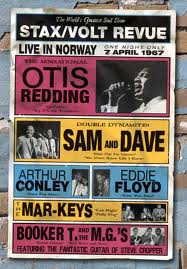Music rooted in time and place: Stax
 When you tune in for Radio Bob’s R&B Show on Wednesday afternoons, chances are you’ll hear some of the artists who recorded on the Stax label, the Memphis-based music company that flourished from the late ’50s to early ’70s. The musicians who got their start on Stax include the likes of Booker T & the MGs, Carla Thomas, Otis Redding, Sam & Dave, Little Milton, and on and on.
When you tune in for Radio Bob’s R&B Show on Wednesday afternoons, chances are you’ll hear some of the artists who recorded on the Stax label, the Memphis-based music company that flourished from the late ’50s to early ’70s. The musicians who got their start on Stax include the likes of Booker T & the MGs, Carla Thomas, Otis Redding, Sam & Dave, Little Milton, and on and on.
According to a new article in Utne magazine, what made the Stax label special was the Stax “scene.” The music company provided a gathering place for white and black musicians who, in the early days of the label, were segregated from each other by the Jim Crow laws of the South.
 “William Bell, who scored his hit ‘You Don’t Miss Your Water’ on Stax in 1962, says the racial dynamic among Stax’s regular cast was otherwordly. ‘Racism was running rampant at the time, but we were like one family. Sometimes we’d have to go to secret places and have a drink, and talk, and exchange ideas. Sometimes other musicians, like Elvis, would join us. We just cared [about] and loved each other for our musical abilities. We were color blind.’ ”
“William Bell, who scored his hit ‘You Don’t Miss Your Water’ on Stax in 1962, says the racial dynamic among Stax’s regular cast was otherwordly. ‘Racism was running rampant at the time, but we were like one family. Sometimes we’d have to go to secret places and have a drink, and talk, and exchange ideas. Sometimes other musicians, like Elvis, would join us. We just cared [about] and loved each other for our musical abilities. We were color blind.’ ”
If you’re a fan of Radio Bob’s, if you’re interested in roots music or the intersection between that music and the civil rights movement of the ’60s, do check out the article from Utne.
Stax was a little gem that glimmered and then faded when the musical and social context of our country changed. But the artists who came through the Stax studios made music that endures. Like I said, tune in to Radio Bob and you’ll hear them.
Tags: music, r&b, radio bob, stax label








…another example of artists leading the way. And they do so with no predisposition towards righting any particular social wrong. Making a thing of beauty stirs passions that can only come from the core of one’s being. The spiritual plane occupied by those whose passion brings them to art allows no space for that ugly sideshow, prejudice (so, of course it makes sense that art is the first sacrificial lamb when school cuts come down the pike).
It’s weirdly incongruent, however, that there were a few well-known musicians who, when off of the bandstand and away from colleagues, publicly acted out a sort of contempt toward the other race. Miles Davis, up until the last phase of his career, seemed a bit like this. Yet in every example I know of, within the context of music making all of these folks were colorblind, like the article states. All of them, including Miles, were equal opportunity employers.
An die Musik!